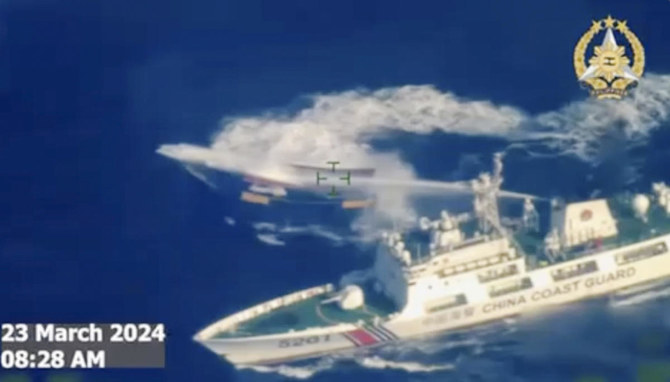MANILA: The Philippines accused the China Coast Guard of blocking a Filipino supply vessel and damaging it with water cannon Saturday morning off a remote and contested South China Sea reef.
The Philippine military said the nearly hour-long attack occurred off Second Thomas Shoal, where Chinese ships have unleashed water cannon and collided with Filipino vessels in similar stand-offs in recent months.
The military released video clips that showed a white ship repeatedly dousing another vessel sailing alongside it with a water cannon. One clip showed two white ships simultaneously firing water at the same vessel.
It also released another clip showing a white ship marked “China Coast Guard” crossing the bow of a grey vessel it identified as the Philippine supply boat Unaizah May 4.
It said the videos were taken Saturday morning while the Unaizah May 4 was on its way to Ayungin Shoal — the Filipino name for the outcrop garrisoned by a small unit of Philippine troops that is also claimed by Beijing.
“The UM4 supply boat sustained heavy damages at around 08:52 (am) due to the continued blasting of water cannons from the CCG vessels,” the military said in a statement, without describing the nature of the damage or whether there were any casualties.
A Philippine coast guard escort vessel later reached the damaged boat “to provide assistance,” the military said.
China Coast Guard spokesman Gan Yu said in a statement that the Philippine convoy “forcibly intruded into the area despite the Chinese side’s repeated warnings and route controls,” adding the Chinese carried out “control, obstruction and eviction in accordance with law.”
“We sternly warn the Philippine side: those who play with fire will bring shame on themselves. The Chinese Coast Guard is ready at all times to resolutely safeguard our country’s territorial sovereignty and maritime rights and interests,” Gan added.
China claims almost the entire South China Sea, brushing off rival claims from countries including the Philippines and an international ruling that its assertion has no legal basis.
The latest confrontation came four days after visiting Secretary of State Antony Blinken said the United States stood by its “ironclad” commitments to defend longtime ally Manila against armed attack in the South China Sea.
Two days after Blinken’s visit to Manila, the China Coast Guard also tried to drive away Filipino scientists who landed on two cays near Scarborough Shoal, another contested South China Sea outcrop.
The Unaizah May 4, which was also damaged in a China Coast Guard water cannon attack off Second Thomas Shoal earlier this month, had returned to the area on Saturday escorted by two Filipino coast guard vessels and two Philippine Navy ships, a Philippine military statement said.
The Philippine soldiers stationed on the shoal live on a derelict navy ship, the BRP Sierra Madre, and require frequent resupplies for food, water and other necessities.
“This particular mission was set up to ensure a full troop complement on board BRP Sierra Madre after one personnel needing serious medical attention was recently evacuated,” the military added.
Four crew members had been hurt by broken glass during the previous water cannon attack on the Unaizah May 4.
Commodore Jay Tarriela, a Philippine coast guard spokesman for South China Sea issues, said in a separate statement that its escort vessel, the BRP Cabra, was “impeded and encircled” by three Chinese coast guard and other vessels early Saturday.
As a result, Cabra was “isolated from the resupply boat due to the irresponsible and provocative behavior of the Chinese maritime forces,” he added.
Philippines accuses China of water cannon attack on supply vessel
https://arab.news/2h46p
Philippines accuses China of water cannon attack on supply vessel

- Philippine military say the nearly hour-long attack occurred off Second Thomas Shoal
Trump considers taking over D.C. government, chides New York

- Trump said his administration had a good relationship with Bowser, he had less complimentary words for Zohran Mamdani, the democratic socialist who won the race to be the Democratic Party’s nominee in New York’s November mayoral election
WASHINGTON: US President Donald Trump said on Tuesday his administration was considering taking over governance of Washington, D.C., and suggested he could take similar action in New York because of his distaste for the leading candidate for mayor there.
Trump has made a similar threat regarding Washington before, but has not followed through even as he criticized crime rates and bashed other institutions there.
The president, speaking during a cabinet meeting at the White House, said his chief of staff, Susie Wiles, was in close touch with Mayor Muriel Bowser, who favors making the city a US state.
“We have tremendous power at the White House to run places when we have to. We could run D.C. I mean, we’re ... looking at D.C.,” Trump said. “Susie Wiles is working very closely with the mayor.”
Bowser’s office declined to comment.
The District of Columbia was established in 1790 with land from neighboring Virginia and Maryland. Congress has control of its budget, but voters elect a mayor and city council, thanks to a law known as the Home Rule Act. For Trump to take over the city, Congress likely would have to pass a law revoking that act, which Trump would have to sign.
Becoming the 51st state would give Washington’s roughly 700,000 residents voting representation in Congress. Democrats support that plan, while Republicans, who are reluctant to hand Democrats any politically safe seats in the House of Representatives and Senate, oppose it.
Trump suggested his administration would run the city better with an appointed leader than the democratically elected government.
“We would run it so good, it would be run so proper. We’d get the best person to run it,” he said. “The crime would be down to a minimum, would be much less. And you know we’re thinking about doing it, to be honest with you.”
While Trump said his administration had a good relationship with Bowser, he had less complimentary words for Zohran Mamdani, the democratic socialist who won the race to be the Democratic Party’s nominee in New York’s November mayoral election.
Trump described Mamdani as a “disaster.” A representative for Mamdani did not immediately respond to a Reuters request for comment.
“We’re going to straighten out New York... Maybe we’re going to have to straighten it out from Washington,” Trump said. “We’re going to do something for New York. I can’t tell you what yet, but we’re going to make New York great again also.”
Joao Pedro brace sends Chelsea into Club World Cup final

- Joao Pedro refused to celebrate after either goal against the club with whom he started his career and made 36 top-team appearances before moving to England with Watford in 2020
EAST RUTHERFORD, United States: New signing Joao Pedro scored twice on his first start as Chelsea eased to a 2-0 win over Fluminense on Tuesday to seal a spot in the final of the Club World Cup.
The Brazilian striker opened the scoring in lethal fashion in the 18th minute of the last-four clash at the MetLife Stadium and struck again shortly before the hour mark as Chelsea set up a showdown with either Real Madrid or Paris Saint-Germain in Sunday’s final.
Signed from Brighton and Hove Albion last week for a reported £60 million ($79 million), the 23-year-old cut short a holiday and made his debut off the bench in the quarter-final win over Palmeiras.
He was then given his first Chelsea start up front here in place of the suspended Liam Delap.
Joao Pedro refused to celebrate after either goal against the club with whom he started his career and made 36 top-team appearances before moving to England with Watford in 2020.
The result ends Fluminense’s impressive run at the tournament after the 2023 Copa Libertadores winners held Borussia Dortmund in the group stage, beat Inter Milan in the last 16 and knocked out Manchester City’s conquerors Al-Hilal in the quarter-finals.
With their exit go the prospects of a South American winner of the first 32-team Club World Cup, with Chelsea claiming back-to-back victories against Brazilian opposition to reach the final.
As always seemed most likely, the trophy will be claimed by one of Europe’s superpowers, with the final now guaranteed to be between two of the last five winners of the UEFA Champions League.
“It is a great achievement. It has been a fantastic season — top four in the league, (winning) the Conference League and now in the final in this competition. We are so, so happy,” Chelsea coach Enzo Maresca told broadcaster DAZN.
“Now finally it is the last game of the season, we can say that, and hopefully we can win the tournament.”
Fluminense coach Renato Portaluppi had described his team as the “ugly duckling” of the tournament due to the enormous difference between their budget and those of the other three remaining sides.
This game ultimately proved to be a step too far for their team, captained by 40-year-old former Chelsea center-back Thiago Silva.
“This was a wonderful Club World Cup,” said Portaluppi.
“There is no crying over spilled milk now. We wanted to get to the final for our fans but we leave with our heads held high, and go back to our reality stronger now than we were before.”
Chelsea were without the suspended Levi Colwill and Delap but Moises Caicedo returned after a ban.
The Premier League side were simply too strong for their opponents in a game watched by 70,556 fans on a hot afternoon just outside New York City.
They went ahead thanks to a wonderful strike by their new forward, who controlled the ball on the edge of the box after Silva had cleared a Pedro Neto cross.
Joao Pedro took a touch and curled a shot beyond veteran goalkeeper Fabio into the far corner, before holding up his hands apologetically toward the Fluminense fans behind the goal.
The team from Rio de Janeiro were an intermittent threat, and Hercules — match-winner against Al-Hilal in the last eight — almost equalized in the 25th minute.
He played a one-two with German Cano and lifted the ball over goalkeeper Robert Sanchez, but Marc Cucurella cleared off the line.
Fluminense were then awarded a penalty 10 minutes before the interval when a set-piece delivery by Rene struck the arm of Trevoh Chalobah in the box.
However, French referee Francois Letexier overturned the decision following a VAR check.
“Had we been awarded the penalty we would have scored and it would have been a different story,” said Portaluppi.
Chelsea got their second on 56 minutes, just after Fluminense had sacrificed one of their three center-backs to send on an extra attacker.
Enzo Fernandez released Joao Pedro on the break, and the forward produced another clinical finish in off the bar.
There were chances for Chelsea to score further goals after that, but the new boy’s double strike sufficed with the only potential black mark on the day the knock which forced Caicedo to limp off before full-time.
Tunisia hands lengthy prison terms to top politicians and former security officials

- A total of 21 were charged in the case, with 10 already in custody and 11 having fled the country
TUNIS: A Tunisian court on Tuesday handed jail terms of 12 to 35 years on high-profile politicians, including opposition leader Rached Ghannouchi and former security officials, a move that critics say underscores the president’s use of the judiciary to cement authoritarian rule.
Among those sentenced on charges of conspiring against the state in the major mass trial, were Nadia Akacha, the former chief of staff to President Kais Saied, local radio Mosaique FM said. Akacha who fled abroad received 35 years.
Ghannouchi, 84, veteran head of the Islamist-leaning Ennahda party, was handed a 14-year term.
Ghannouchi who was the speaker of the elected parliament dissolved by Saied, has been in prison since 2023, receiving three sentences of a total of 27 years in separate cases in recent months.
A total of 21 were charged in the case, with 10 already in custody and 11 having fled the country.
The court sentenced former intelligence chief Kamel Guizani to 35 years, former Foreign Minister Rafik Abdessalem to 35 years, and Mouadh Ghannouchi, son of Rached Ghannouchi, to 35 years. All three have fled the country.
Saied dissolved the parliament in 2021 and began ruling by decree, then dissolved the independent Supreme Judicial Council and sacked dozens of judges, a move that opposition called a coup which undermined the nascent democracy that sparked in 2011 the Arab Spring uprisings.
Saied rejects the accusations and says his steps are legal and aim to end years of chaos and corruption hidden within the political elite.
Most opposition leaders, some journalists, and critics of Saied have been imprisoned since he seized control of most powers in 2021.
This year, a court handed jail terms of 5 to 66 years to opposition leaders, businessmen and lawyers on charges of conspiring as well, a case the opposition says is fabricated in an attempt to stamp out opposition to the president.
Human rights groups and activists say Saied has turned Tunisia into an open-air prison and is using the judiciary and police to target his political opponents.
Saied rejects these accusations, saying he will not be a dictator.
Travelers no longer have to remove their shoes during security screenings at US airports

- All passengers between the ages of 12 and 75 were required to remove their shoes, which were scanned along with carry-on luggage
WASHINGTON: Travelers racing to catch a flight at US airports no longer are required to remove their shoes during security screenings, Homeland Security Secretary Kristi Noem said Tuesday.
Noem said the end of the ritual put in place almost 20 years ago was effective nationwide effective immediately. She said a pilot program showed the Transportation Security Administration had the equipment needed to keep airports and aircraft safe while allowing people to keep their shoes on.
“TSA will no longer require travelers to remove their shoes when they go through security checkpoints,” Noem said.
While shoe removal no longer is standard procedure, some travelers still may be asked to take off their footwear “if we think additional layers of screening are necessary,” she added.
Security screening sans shoes became a requirement in 2006, several years after “shoe bomber” Richard Reid’s failed attempt to take down a flight from Paris to Miami in late 2001.
All passengers between the ages of 12 and 75 were required to remove their shoes, which were scanned along with carry-on luggage.
The travel newsletter Gate Access was first to report that the security screening change would happen soon.
Travelers previously were able to skirt the requirement if they participated in the TSA PreCheck program, which costs around $80 for five years. The program allows airline passengers to get through the screening process without removing shoes, belts or light jackets, and without having to take their laptops and bagged toiletries out.
The TSA began in 2001 when President George W. Bush signed legislation for its creation two months after the 9/11 attacks. The agency included federal airport screeners that replaced the private companies airlines had used to handle security.
Over the years the TSA has continued to look for ways to enhance its security measures, including testing facial recognition technology and implementing Real ID requirements.
One of the most prominent friction points for travelers is the TSA at screening checkpoints. President Donald Trump’s Transportation Secretary Sean Duffy asked the public in an April social media post what would make travel more seamless.
The following day, Duffy posted on X that, “It’s clear that TSA is the #1 travel complaint. That falls under the Department of Homeland Security. I’ll discuss this with @Sec_Noem.”
Trump fired TSA Administrator David Pekoske in January in the middle of a second five-year term, though he was appointed by Trump during his first term in the White House. Pekoske was reappointed by President Joe Biden.
No reason was given for Pekoske’s departure. The administrator position remains vacant, according to the TSA website.
‘Hostage,’ Eli Sharabi’s memoir about life in Hamas captivity, is coming to the US

- Sharabi reveals how his faith gave him the resilience to endure the horrific conditions and overcome mental anguish
NEW YORK: A memoir by an Israeli man held in captivity for more than a year by Hamas is coming out this fall in the US Eli Sharabi’s “Hostage,” written in Hebrew and already a bestseller in Israel, is the first published memoir by anyone kidnapped by Hamas during the deadly surprise attack of Oct. 7, 2023. Harper Influence, an imprint of HarperCollins Publishers, announced Tuesday that the English-language edition of his book will come out this Oct. 7, the 2-year anniversary.
Sharabi, 53, was released in early February and has said that he had shrunk to under 100 pounds — less than the weight of his youngest daughter, who was killed along with his wife and older daughter. More than 1,000 were killed in the attack and more than 200 taken hostage.
“It was important to me that the story come out as quickly as possible, so that the world will understand what life is like inside captivity,” Sharabi said in a statement. “Once they do, they will not be able to remain indifferent. But I also want readers to know that even in the darkest of times, you can always seek out the light and choose humanity.”
According to Harper Influence, Sharabi writes about his experience with his captors in “stark, unflinching prose, detailing the relationships the hostages formed with one another, including Alon Ohel, still a hostage in Gaza, with whom Sharabi formed an unbreakable father-son bond.”
“Along the way, Sharabi reveals how his faith gave him the resilience to endure the horrific conditions and overcome mental anguish,” the announcement reads in part.






















